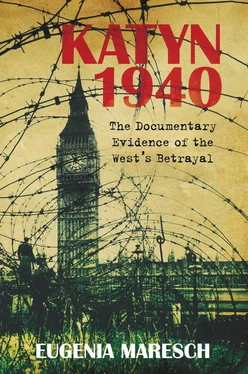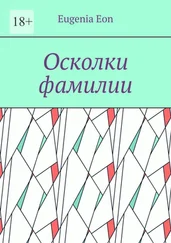18. The men who were taken to Katyn are dead and their death is a serious loss to Poland. Nevertheless, unless the Russians are cleared of the presumption of guilt, the moral repercussions in Poland, in the other occupied countries and in England of the massacre of Polish officers may well have more enduring results than the massacre itself; and this aspect of things, therefore, deserves attention. As I have as yet seen no reliable reports on public feeling in Poland and German-occupied Europe, my comments will relate only to our own reaction to the uncovering of the graves.
19. This despatch is not primarily concerned with the reaction of the British public, press or Parliament, who are not in such a good position as His Majesty’s Government to form an opinion as to what actually happened. We ourselves, on the other hand, who have access to all the available information, though we can draw no final conclusions on vital matters of fact, have a considerable body of circumstantial evidence at our disposal, and I think most of us are more than half convinced that a large number of Polish officers were indeed murdered by the Russian authority and that it is indeed their bodies (as well, maybe, as other bodies) which have been unearthed. This being so, I am impelled to examine the effect on myself of the facts and allegations and to adjust my mind to the shocking probabilities of the case. Since the Polish Government is in London and since the affair has been handled directly by yourself and the Prime Minister with General Sikorski and Count Raczyński, it may seem redundant for me to comment on it, as I should naturally do were the Polish Government and I both abroad; but though all important conversations have been between Ministers and leaders of the Polish Government, my contacts have doubtless been more numerous than yours during the last few weeks with Poles of all kinds and they have possibly spoken to me with less reservation than to yourself. I hope therefore I may, without impertinence, submit to you the reflections which follow.
20. In handling the publicity side of the Katyn affair, we have been constrained by the urgent need for cordial relations with the Soviet Government to appear to appraise the evidence with more hesitation and leniency than we should do in forming a common sense judgement on events occurring in normal times or in the ordinary course of our private lives; we have been obliged to appear to distort the normal and healthy operation of our intellectual and moral judgments; we have been obliged to give undue prominence to the tactlessness or impulsiveness of Poles, to restrain the Poles from putting their case clearly before the public, to discourage any attempt by the public and the press to probe the ugly story to the bottom. In general we have been obliged to deflect attention from possibilities which in the ordinary affairs of life, would cry to high heaven for elucidation and to withhold the full measure of solicitude which, in other circumstances, would be shown to acquaintances situated as a large number of Poles now are. We have in fact perforce used the good name of England like the murderers used the little conifers to cover up a massacre; and, in view of the immense importance of an appearance of Allied unity and of the heroic resistance of Russia to Germany, few will think that any other course would have been wise or right.
21. This dislocation between the public attitude and our private feelings we may know to be deliberate and inevitable; but at the same time, we may, perhaps, wonder whether, by representing to others something less than the whole truth so far as we know it, and something less than the probabilities so far as they seem to us probable, we are not incurring a risk of what – not to put a fine point on it – might darken our vision and take the edge off our moral sensibility. If so, how is this risk to be avoided?
22. At first sight it seems that nothing less appropriate to a political despatch than a discourse upon morals can be imagined; but yet, as we look at the changing nature of the international world of today, it seems, that morals and international politics are becoming more and more closely involved with each other. This proposition has important consequences; but since it is not universally accepted I hope the following remarks in support of it are not out of place.
23. Nobody doubts that morals now enter into the domestic politics of the United Kingdom, but it was not always so. There was a time when the acts of the Government in London were less often the fruit of consultation and compromise in the general interests of all than of the ascendancy of one class or group of citizens who had been temporarily successful in the domestic arena. It was the realisation of the interdependence of all classes and groups of the population of England, Scotland and Wales, which discouraged the play of intestine power politics and set the welfare of all above the advantage of the strong. Similar causes are producing similar results in the relations of states to each other. ‘During the last four centuries of our modern era’ writes Professor [Albert] Pollard [13] Albert Frederick Pollard (1869–1948) constitutional historian at the University of London 1903, served on the Government Committee on the League of Nations, visiting Professor in Canada and USA, founder and Director of the Institute of Historical Research until 1939, contributed to the Dictionary of National Biography, wrote articles on parliamentary history for the English Historical Review.
‘the last word in political organisation has been the nation; but now that the world is being unified by science and culture’ the conception of the nation state as the largest group in which human being are organically associated with each other is being superseded by the conception of a larger, it may be of a European or indeed of a world-wide unity: and ‘the nation is taking its place as the bridge, the half-way house, between the individual and the human family.’ Europe, and indeed the world, is in the process of integrating themselves and ‘the men and women of Britain’ as you said at Maryland, ‘are alive to the fact that they live in one world with their neighbours.’ This being so, it would be strange if the same movement towards the coalescence of smaller into larger groups which brought about the infiltration of morals into domestic politics were not also now bringing about the infiltration of morals into international politics. This, in fact, it seems to many of us is exactly what is happening, and is why as the late M [James] Headlam-Morley [14] James Headlam-Morley (1863–1929), historical adviser to the propaganda department in 1917 and the FO until 1928. Took part in negotiations at the Paris Peace Conference, (Treaty of Versailles), 28 June 1919.
said: ‘what in the international sphere is morally indefensible generally turns out in the long run to have been politically inept.’ It is surely the case that many of the political troubles of neighbouring countries and some of our own have in the past arisen, because they and we were incapable of seeing this or unwilling to admit it.
24. If, then, morals have become involved with international politics, if it be the case that a monstrous crime has been committed by a foreign government – albeit a friendly one – and that we, for however valid reasons, have been obliged to behave as if the deed was not theirs, may it not be that we now stand in danger of bemusing, not only others but ourselves: of falling as Mr [John] Winant [15] John G. Winant, American Ambassador in London.
said recently at Birmingham, under St Paul’s curse on those who can see cruelty ‘and burn not’? If so, and since no remedy can be found in the early alteration of our public attitude towards the Katyn affair, we ought, maybe, to ask ourselves how, consistently with the necessities of our relations with the Soviet Government, the voice of our political conscience is to be kept up to concert pitch. It may be that the answer lies, for the moment, only in something to be done inside our own hearts and minds where we are masters. Here at any rate we can make a compensatory contribution – a reaffirmation of our allegiance to truth and justice and compassion. If we do this we shall at least be predisposing ourselves to the exercise of a right judgement on those half political half moral questions (such as the fate of the Polish deportees now in Russia) which will confront us both elsewhere and more particularly in respect to Polish-Russian relations as the war pursues its course and draws to its end; and so, if the facts about the Katyn massacre turn out to be as most of us incline to think, shall we vindicate the spirit of these brave unlucky men and justify the living to the dead.
Читать дальше












